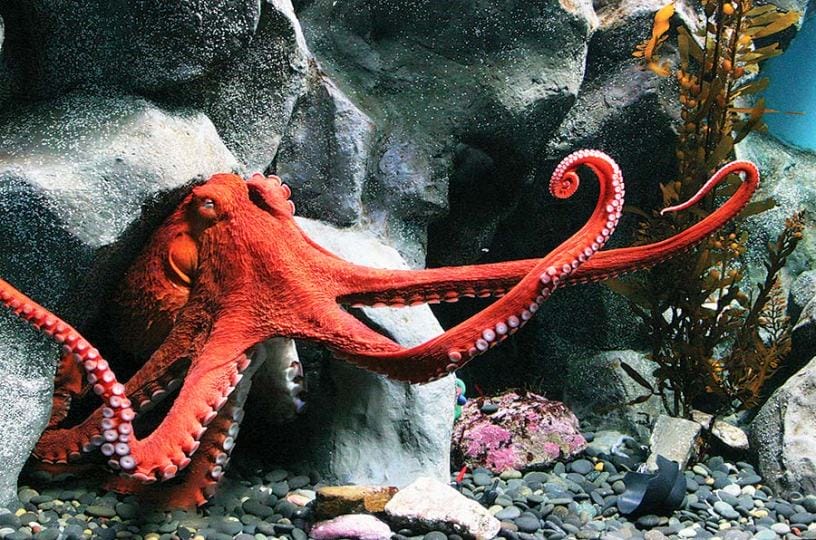

The only octoculture effort in the U.S., Kanaloa Octopus Farms, on Hawaii's Big Island, has hit the same “bottleneck,” as founder Jake Conroy calls it. But it failed at raising paralarvae and reverted to ranching-growing wild-caught octopuses to market size in aquatic pens, a system also used in Spain. In 2015, an Australian firm reported remarkable success at battery-farming the common Sydney octopus. But that life cycle presents one big hurdle: sustaining delicate planktonic octopus hatchlings, called paralarvae, until they can begin this rocketing growth. They can add 5 percent of body weight in a day. Like salmon, they're short-lived and fast-growing most common species live one to two years, a few jumbo varieties three to five. Some aspects of the octopus life cycle make them attractive aquaculture candidates. “The sea is getting crowded-more fishermen, less octopus.” Morocco and Mauritania, two main producers, have limited catches to protect stocks.Īquaculture advocates say that farming octopuses is the only way to ensure sustainability while satisfying demand.

“I hardly go out to fish anymore,” Yucatán fisherman Antonio Cob Reyes told me. ” He and his comrades urged a temporary fishery closure to help stocks recover. “Today, I go to the sea and I get 10 or 20 kilograms of octopus,” one fisherman in nearby Portugal told a newspaper, “when in other years it was more than a hundred kilos. Pulpo a la gallega may be the national dish of Spain's Galicia region, but Galicia imports 20 times as much octopus as it catches. But the global catch- 420,000 metric tons a year, the FAO reports-goes largely to affluent consumers in South Korea, Japan, Spain, Italy, Portugal, and, lately, the United States. Thousands of fishermen in Mexico's Yucatán and Campeche states lure their prey by dangling crabs from long bamboo poles. Most wild octopus fisheries are still more artisanal than industrial, using small boats and traditional techniques. It argues that the grim “ethical and environmental consequences” of industrial meat production “should lead us to ask whether we want to repeat mistakes already made with terrestrial animals with aquatic animals, especially octopus.” That debate caught fire last year when Jennifer Jacquet, a professor of environmental studies at New York University, and several co-authors posted an essay, “The Case Against Octopus Farming,” that quickly went viral. ( Also read about the growing trend for pet octopuses.) Big brains, complex behavior, and precocious curiosity have made these improbable mollusks mediagenic poster creatures for animal rights and welfare-and the subject of an emerging battle over the ethics and potential environmental impacts of raising them for food. Pigs, however, aren’t as graceful, mysterious, and charismatic as octopuses. “I know those who would never eat them but have no qualms about eating pigs, and there's abundant evidence that pigs are highly intelligent.” “People have this weird love affair with octopuses,” says biologist Rich Ross at the California Academy of Science, in San Francisco. For many people, however, they mean much more than tasty tidbits. Demand and prices have surged in recent years, even as catches have fallen in traditional octopus meccas such as Spain and Japan and as warming, acidifying seas threaten further declines.Īt a glance, therefore, these tasty tentacle bearers seem ripe for aquaculture. Long staples of Mediterranean and East Asian cuisines, octopus ( pulpo in Spanish, tako in Japanese) is now a global delicacy, buoyed by the popularity of sushi, tapas, poke, and desire for high-quality protein. Not good, a new contingent of critics contends: Octopus aquaculture will further deplete marine ecosystems and needlessly torment these most sensitive and intelligent of invertebrates. Now they’re becoming an ethical flashpoint, as researchers like Rosas puzzle out ways to make commercial octopus farming feasible and, they claim, relieve growing pressure on wild populations. “ Maravilloso!” he murmurs.Īround the world, octopuses have long been objects of desire and wonder. Even Rosas, a biologist at the National Autonomous University of Mexico who's worked for years to turn creatures like this into a profitable commodity, delights in its prehensile grace. A mouse-size octopus with tentacles like knotted threads, ghostly pale save for big, black eyes, wriggles across his palm and twines around his fingers. He coaxes its wary occupant out onto his hand. SISAL, YUCATÁN, MEXICOIn a damp, darkened shoreside laboratory near the Yucatán hamlet of Sisal, Carlos Rosas Vázquez lifts one of the scores of small conch shells littering a black plastic tank.


 0 kommentar(er)
0 kommentar(er)
